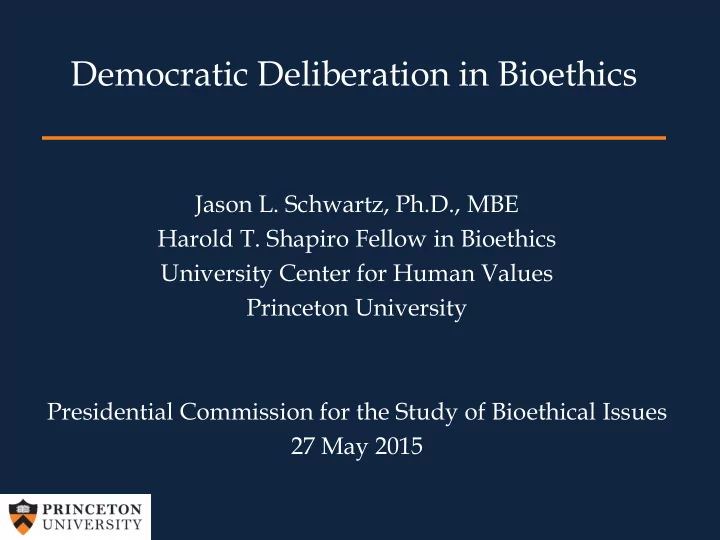

Democratic Deliberation in Bioethics Jason L. Schwartz, Ph.D., MBE Harold T. Shapiro Fellow in Bioethics University Center for Human Values Princeton University Presidential Commission for the Study of Bioethical Issues 27 May 2015
U.S. National Bioethics Commissions 1. National Commission for the Protection of Human Subjects of Biomedical and Behavioral Research (1974-78) 2. Presidential Commission for the Study of Ethical Problems in Medicine and Biomedical and Behavioral Research (1978-83) 3. Advisory Committee on Human Radiation Experiments (1994-95) 4. National Bioethics Advisory Commission (1996-2001) 5. President’s Council on Bioethics (2001-09) 6. Presidential Commission for the Study of Bioethical Issues (2009-Present)
Federal Advisory Committee Act (1972) • Origins and legislative history – Science and biomedicine not a primary focus • Requirements – Committee establishment, renewal, reporting – Public meetings and public participation, public access to meeting materials • Consequences for health agencies; perceived value • Major amendments: 1976 (Sunshine Act), 1997 (NAS)
National Commission for the Protection of Human Subjects of Biomedical and Behavioral Research -- Reports on research on the fetus, prisoners, children; psychosurgery; The Belmont Report; others “The divisiveness of the issues and the differences between commissioners…could have destroyed the possibility of respectful working relations among the commissioners. The chemistry worked in another way, however, and the pattern was established of members taking each other’s views very seriously and seeking common ground on which to base recommendations.” -- B. Gray, Society’s Choices, 1995 (p. 267)
The National Commission and The Belmont Report “They decided that a closed retreat be held (meetings were usually open to the public by law) so that a freewheeling discussion could explore the nature and role of ethical principles for human research.” -- A. Jonsen, The Birth of Bioethics, 1998 (p. 102)
The National Commission and The Belmont Report
Presidential Commission for the Study of Ethical Problems in Medicine and Biomedical and Behavioral Research -- Reports on defining death, forgoing life-sustaining treatment, compensation for research injuries, access to health care, others. -- 28 two-day meetings in 38 months (1980-83); 300 scheduled witnesses; background papers; public attendance (25-200) and regular public comment; mailing list of 1500 -- “Doing ethics in public” = “need for responsible and thoughtful comments and deliberation” -- Drive toward accessibility and consensus President’s Commission, Summing Up (1983); A. Capron, Hastings Center Report (1983)
Advisory Committee on Human Radiation Experiments -- Review research involving intentional exposure to ionizing radiation or intentional environmental releases of radiation, 1944-74 -- Mission as an ‘openness commission’ – R. Faden -- 16 multi-day meetings (4/94-7/95); public forums in cities near important research locations; 200+ public witnesses; interviews and oral histories with government officials, researchers, physicians, others -- Created and functioned in tradition of bioethics commission and crisis-oriented commission ACHRE Final Report (1995); R. Faden, HCR (1996)
National Bioethics Advisory Commission -- Reports on human stem cell research, human cloning, human subjects research, others -- Three ‘public members’ and public engagement efforts -- “Importance of shared views” – stem cell report (1999) “In our view, an appropriate approach to public policy in this arena is to develop policies that demonstrate respect for all reasonable alternative points of view and that focus, when possible, on the shared fundamental values that these divergent opinions, in their own ways, seek to affirm.” NBAC Charter; Meslin and Shapiro, KIEJ (2002); Meslin, Accountability in Research (1999)
President’s Council on Bioethics “…The mission of the Council includes the following functions: 1. To undertake fundamental inquiry into the human and moral significance of developments in biomedical and behavioral science and technology; 2. To explore specific ethical and policy questions related to these developments; 3. To provide a forum for a national discussion of bioethical issues; 4. To facilitate a greater understanding of bioethical issues; 5. To explore possibilities for useful international collaboration on bioethical issues.” President’s Council on Bioethics Charter (2001)
Nuffield Council on Bioethics • May 2015 report on clinical research in children and adolescents • Public engagement activities: – Stakeholder group of young people and parents – Multiple requests for comments (professional groups; parents; young people) – Public fact-finding meetings – Consultations in schools and communities in U.K. and Kenya http://nuffieldbioethics.org/project/children-research/evidence-gathering-activities/
Evaluating the Impact of National Bioethics Commissions and their Recommendations -- What are appropriate measures of success? What constitutes ‘impact’? How to measure, evaluate? -- Bioethics commissions as public forums: “As a public forum, a commission’s ability to address public concerns, and not just professional or scholarly debates; its ability to engage public ways of moral decision making; and its capacity to inform and encourage public reflection are all critical indicators of its success at fulfilling democratic purposes.” -- Dzur and Levin, KIEJ, 2004
“Summing Up” – President’s Commission, 1983 “In a pluralistic society, a commission on bioethical issues can serve as more than a forum for the airing of differences on matters of concern…It can also articulate the broad area of agreement that already exists in this country on most of the issues at stake—and it can, if it is fortunate, provide the means for enlarging the field of common agreement… Finally, a commission on bioethics can play an important part in engendering and encouraging the process by which a vibrant and ever-developing society reexamines, revises, and reaffirms its system of values and belief…” (p. 86)
Democratic Deliberation in Bioethics Jason L. Schwartz, Ph.D., MBE Harold T. Shapiro Fellow in Bioethics University Center for Human Values Princeton University Presidential Commission for the Study of Bioethical Issues 27 May 2015
Recommend
More recommend